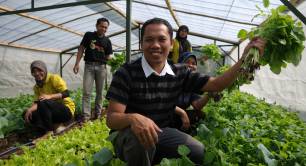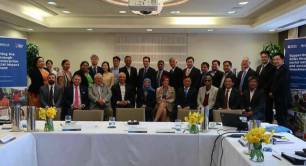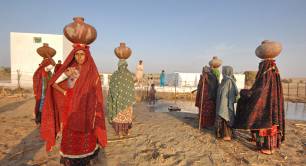UN: Asia-Pacific social business champions must convince neighbouring countries to follow their lead post-Covid
It’s time to move the sustainable business agenda from the margins to the mainstream in post-pandemic economy rebuilding, says United Nations Economic and Social Commission for Asia and the Pacific ahead of key meeting
Champions of social business and impact investment across the Asia-Pacific were last week urged by the United Nations to highlight their ground-breaking work with the aim of rebuilding sustainable post-Covid economies across the region.
Representatives of seven countries in the Asia-Pacific were invited to attend an online meeting on Wednesday 22 July in preparation for the third session of the technology and innovation committee of the United Nations Economic and Social Commission for Asia and the Pacific (ESCAP).
The Committee on Information and Communications Technology, Science, Technology and Innovation session on 19-20 August – which will bring together representatives from 62 member and associate member states across the Asia-Pacific region – includes a focus upon “business innovation for inclusive and sustainable development”.
There is an opportunity to promote this agenda to other countries with concrete recommendations about how we can move it from the margins to the mainstream – Jonathan Wong
Jonathan Wong, chief of technology and innovation at ESCAP (pictured above), told the attendees last week: “You really have been the champions of promoting inclusive business, social enterprise and impact investment in the Asia-Pacific region.”
He added: “There is an opportunity at this meeting [in August] to promote this agenda to other countries with concrete recommendations about how we can move this agenda from the margins to the mainstream.”
Pandemic boosts importance of social enterprise and impact investment
Tristan Ace, who leads the British Council’s work in inclusive economic development in the region, often working in partnership with ESCAP, said: “This is an opportunity to showcase some of the fantastic work that has been achieved.”
The impact of the Covid-19 pandemic made innovative approaches to business even more important, said Mia Mikic, ESCAP’s trade, investment and innovation director (pictured right).
“Social enterprise and impact investment are still a very small part of the overall business sector,” she said. “We need to invest more energy into the discovery of the ‘new normal’.”
She added that societies needed to pay greater regard to the sustainable development agenda going forward.
UNESCAP wants to promote ‘innovative models’ of a new economy
Attendees at last week’s meeting, which was hosted via Zoom from ESCAP’s Bangkok headquarters, included representatives from government and civil society from Malaysia, Pakistan, the Philippines, Thailand, Vietnam, Myanmar and Bangladesh. Pioneers Post was invited to observe the proceedings.
Much of the 90-minute meeting was focused upon attendees sharing their successes and challenges in supporting the development of businesses with a triple bottom line in their countries.
Many had received practical support from ESCAP and the British Council to do this. The two organisations are working together to promote the growth of social enterprise and impact investment across the Asia-Pacific region to move towards achieving the Sustainable Development Goals. The support is carried out through research, analysis, training, guidance to policymakers, and by creating new collaborations.
READ MORE: Get set, go! Social enterprise ready to grow in Asia-Pacific region
Issues raised by the attendees at the meeting included:
- The “implementation gap”: while some countries had policies in place to support social enterprises, there were still barriers to getting initiatives up and running.
- Different expectations, particularly around rates and types of return, from social entrepreneurs and impact investors.
- A desire for regional benchmarks to be established to compare the impact of social enterprises.
- An emphasis that many social enterprises and inclusive businesses were focused on meeting the Sustainable Development Goals.
Drawing the meeting to a close, Wong said that the ESCAP committee session in August provided an opportunity for the group to share what they were doing with the dozens of ESCAP member countries which weren’t looking at this agenda, make the business case to ministers, and share recommendations about how to move the agenda forward across the region.
ESCAP was looking to promote “innovative models for what a new economy could look like”, he said.
|
What is “business innovation”? Although countries use varying terminology, ESCAP’s Jonathan Wong, quoted in this story, uses the term “business innovation” to mean new business practices aimed at developing effective solutions to social and environmental issues. Under the umbrella of social and business innovation, ESCAP defines three “subsets” which are:
Read more in the ESCAP preparatory note for the August session. |





